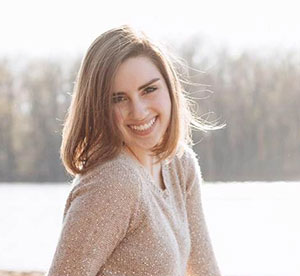A young woman who seems to have it all together opens up about the journey that shatters the concept of perfection.
__________________________________________________
Damaris Wyand, junior business administration major from St. Charles, Missouri, goes by many titles: president, editor, teacher, student, mentor, sister. But beneath all her success and her crisp black blazer lies a secret ready to be revealed. “I had an eating disorder that I went to treatment for. I got two different diagnoses from two different people but I think the one that fit most or was the most accurate was anorexia,” Wyand said. The college student who seemed to have it all together realized she did not. Wyand, for awhile, was able to control how other people saw her, but it came at a great emotional and physical price. Upon reflection with a mentor, Casey Peterson, minister of students for spiritual development at Missouri Baptist University, Wyand admitted she had been suffering from anorexia for about five years. “In the beginning stages it wasn’t so much of something that I wanted help for. I never really wanted help for it until probably three months leading up to when Casey finally talked to me,” Wyand recalled. “I knew that I was stuck in a cycle that I couldn’t get out of on my own. I was miserable, but I also didn’t think that I could live without it.” In this cycle, Wyand would go days without eating and work her schedule around when she could go to the gym. She was constantly in pain but she allowed herself to continue living this lifestyle just to feel a sense of control. After an interview with Peterson for a community leader position, Peterson asked Wyand if he could ask a personal question. He asked her if she had an eating disorder. “I was really surprised at first. Then I thought about it because I was trying to decide if I was going to tell him the truth or not,” Wyand said, pausing with an expression as if gears were turning in her mind. “I knew that I did but I wasn’t sure that I wanted to admit it, but then I said, ‘Yeah I think I do,’ and from there we just kinda talked a little bit and that started the process of telling my parents and towards going to treatment.” Wyand opened up to her parents, “I sat down and told my parents, which was really hard, and probably, like, one of the hardest conversations I’ve ever had in my life.” Her parents were upset but decided the next step was to get her help, so Wyand saw a therapist for about a month before realizing that more needed to be done. “Honestly in one hour a week she couldn’t do very much because it was five years of thought patterns and five years of behaviors and that doesn’t get undone in one hour a week,” Wyand said. The therapist recommended Wyand go into a treatment center for some time during the summer. Wyand was admitted into treatment July 1, 2016. “I remember walking in and just seeing the other people who were there and they just looked sad and tired,” she said. Wyand was surrounded by battle-worn individuals ranging from girls in their late teens to middle-aged women, all struggling together. “A lot of people were going through a lot of stuff and it was like a very hard group in general but emotions were high. People were like sharing their stories and it was really hard,” she said. “I cried like three times that day because I was just so broken-hearted for the other people that were there and listening to them talk about their experience and I couldn’t stop myself from thinking, you know, like, I shouldn’t be here, I’m not bad enough to need this, like, these people have been through hell and it was so, so, so sad. So it was really hard the first day.” Wyand did not come from a troubled home life or come from an abusive relationship like many of these women did.
TREATMENT
The program Wyand was in met eight hours per day, including meal times. “When I first got there, they would have a sample plate that they would have out at every meal. Then halfway through they decided not to do the sample plate and so we didn’t know how much we were supposed to get anymore,” Wyand recalled. “Obviously, when you have an eating disorder you don’t know what portions are anymore. I had no concept of what was a normal amount of food to eat or what was a normal meal because I hadn’t done it for so long. So that was really difficult.” Many people view meals as an enjoyable time, but in the treatment center, meals were an everyday battle, and seeing others suffer was just as painful. “There was this one girl that she would just sit there at meals and she looked like she was so anxious and so stressed out. She was a happy person the rest of the time,” Wyand said. “Then you’d see her at meals and she would look like she’d break down in tears. It’s really hard to see people like that not able to eat a plate of food. That’s such a normal thing to do but they couldn’t.” Normal was difficult because these women, including Wyand, have not lived within normal for years. Wyand once knew what normal was, what a normal meal was, but at this point in time, normal was a forgotten concept. To be normal was to break everything she knew. “I never let myself feel emotions from really hard things. And pushing all that down, I needed something to cope with it and that’s where the disorder came in for me. It was a way to control my life and a way to control how other people treated me,” Wyand said. “It was a way to help me not feel things that I didn’t want to feel.” Feelings of rejection, worry, sadness, stress and anxiety were pushed down by anorexia. A complete change in mindset had to be made. “Anything I used to deal with hard things in my life I couldn’t do anymore. Like, I couldn’t skip meals, I couldn’t go exercise for a long time. I couldn’t do anything,” Wyand said. “The only thing I had left in my life was God. I had no way to cope except by running to God. I got closer to him.” So far she had faced three battles: realizing her disorder, telling her parents about it, and going through the treatment center, but even after overcoming those, another waited for her. “It was also hard to go back to interacting with people I was friends with. In treatment, you share everything that you’re going through, you share how you’re feeling all the time and people sit with you through crying and being angry and not being able to speak sometimes. But in the real world everybody puts on a front and it was very hard to get used to coming back to that,” Wyand said. “They didn’t have any concept of my summer and what I had just gone through.” Now, Wyand is in a different place than she was before her journey in treatment, and she gives God all the glory. “He made the difference in my recovery and I replaced constantly that idol of wanting control or wanting approval or whatever it is. It’s like I have to put God in that spot instead,” she said. “Today I am in recovery and God is good. That doesn’t mean that I don’t still have thoughts about it sometimes or, you know, whenever something hard comes along that doesn’t mean I’m never tempted to deal with it in an unhealthy way. Praise the Lord I’m not where I was.” Wyand has a firsthand experience with struggling in everyday life. She has something to say to others who may be struggling like she was. “Know that if you’re caught in something like that, whatever it happens to be, you might think that there’s no way you could ever live without it. You might think that you can’t imagine life without an eating disorder, without an addiction, without self harm, without depression even, but there is so much life to be lived on the other side of those things,” Wyand said. “You can’t live in a cage and those things keep you trapped, they keep you stuck and they keep you from living the life God wants you to have. It keeps you from being able to live your life fully for God’s glory because you will always want to put something in front of Him. … You might not be able to imagine life without whatever it is that you’re caught in but you need to get away from it. You need to seek help,” she said, “even though it doesn’t seem life can be better, my life is so much better now than it could have ever been before.”LOOKING BACK
TO THOSE STRUGGLING
